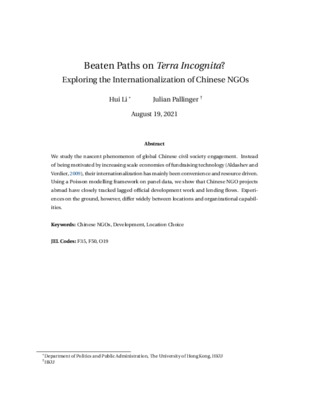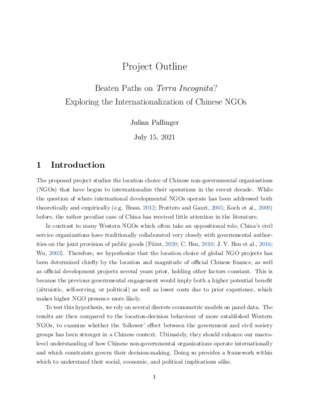About Julian Pallinger
Hi there! I'm Julian, an economics student at the University of Hong Kong and a new Laidlaw scholar. Originally, I planned to work on developmental economics, more specifically on the developmental opportunities and challenges of the Rwandan metal industry, but these plans have been canceled due to COVID-19. Thus, I have switched to working on research in international trade by trying to better understand regional value chain integration between China and members of ASEAN.
For the Laidlaw project, however, I work on a quantitative paper that aims at better understanding the constraints governing the internationalization of Chinese NGOs.
Apart from study, I like to discuss politics and philosophy, play ultimate frisbee, dance salsa, hike, cycle, and read fiction. Feel free to connect!



Recent Comments
Fascinating topic! How would you control for the possibility that more English speakers (traders) would migrate to better connected coastal burrows in Ireland? Idk if this would show up as "English speakers" in the statistics? (But does not necessarily indicate a change in language of the native population). Adding fixed effects would perhaps control for some spatial heterogeneity between port and rural regions. Perhaps you could locate where the language was outlawed first, and use this variation to estimate some causal relation (Difference in Difference?). You'll figure it out. Best of luck!
I am looking forward to reading your paper.
J
All the best for your research! It seems you have considered a lot already. I am not really familiar with the (historical) context so I cannot really judge. But the linguistic difference between Northern Ireland and the rest is striking. Perhaps the border variation can also be used. (Estimate increase in trade using a gravity model due to missing border coefficient, and use it to predict change in language. But this includes a lot of other factors so is probably not helpful. And time is limited, so yeah.)
Best,
Julian
Fascinating topic! How would you control for the possibility that more English speakers (traders) would migrate to better connected coastal burrows in Ireland? Idk if this would show up as "English speakers" in the statistics? (But does not necessarily indicate a change in language of the native population). Adding fixed effects would perhaps control for some spatial heterogeneity between port and rural regions. Perhaps you could locate where the language was outlawed first, and use this variation to estimate some causal relation (Difference in Difference?). You'll figure it out. Best of luck!
I am looking forward to reading your paper.
J
Thanks for the useful tips Maria!
My research project investigates the application of the philosophical concept of existentialism in climate change policy and whether it can shift the mentality of policy makers and enable them to take radical action against climate change.
Maybe not by policy makers, but through some collective sublimation - the turning creative of (existential) angst - of ressentiment (see Nietzsche) by those who have no part but have to live with the consequences. For a more expansive exploration of who 'those' are, the rather recent book by Bruno Latour Down to Earth: Politics in the New Climatic Regime may be helpful to you. Good luck for your project!